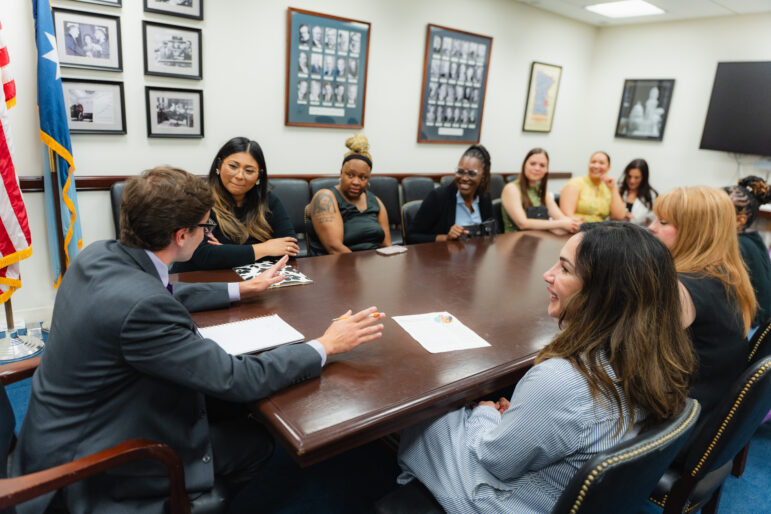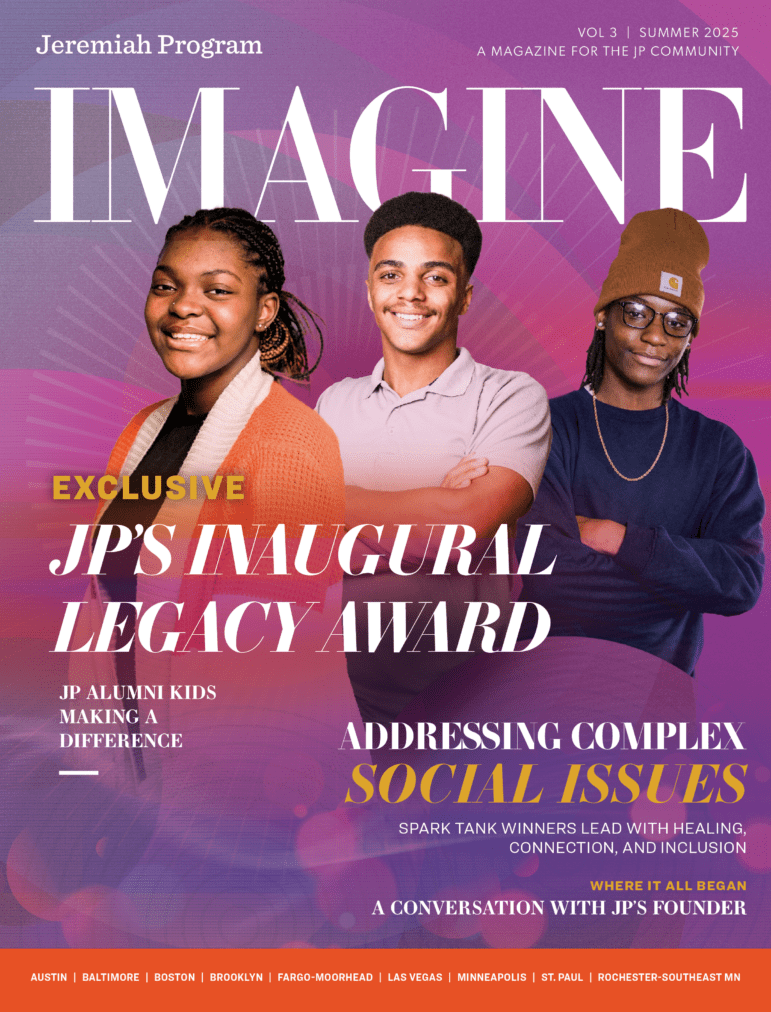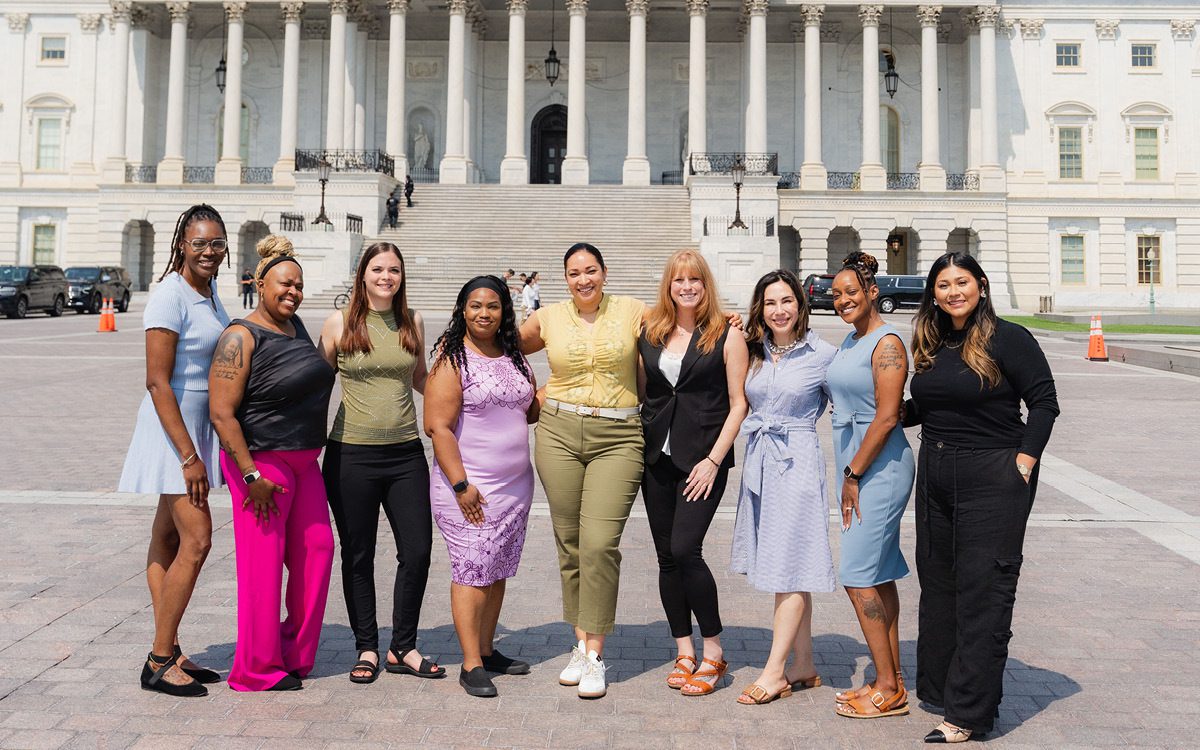Built by Moms, for Moms
Jeremiah Program alumni are advocating for public policy that works for all families.
One thing anyone familiar with Jeremiah Program knows: JP moms are problem solvers. They are expert multitaskers on an economic mobility journey who make decisions and craft solutions daily for their families — from deciding which bedtime stories to read to balancing their household budgets to managing their educational pursuits while caring for young children.
That’s why one of JP’s guiding principles is that women experiencing poverty are the right people to design and scale solutions that meet the needs of their communities. This principle has never been more evident than in the voices and vision of the 2024–2025 JP Alumni Fellows: moms who are advocating for public policy that reflects what single mothers and their children truly need to thrive.
“I hope that we as a fellowship can impact the way single mothers are treated in all walks of life,” said Kylie Schultz, a member of the 2024-2025 fellowship cohort. “We want mothers to be treated better in healthcare and have healthier outcomes, receive proper nutrition, affordable child care and housing, and educational supports.”
That vision has resulted in JP’s newly reimagined public policy pillars — five focus areas that define the systems-level advocacy work JP will champion in the years ahead. These pillars are more than talking points. They’re rooted in real lives, real challenges, and real solutions born from the lived experiences of single moms.
Reimagining the System from the Inside
The process of updating these pillars began with listening.
Over several months, JP Alumni Fellows held conversations with other alumni, current JP moms, and public policy committee members from across the country. The question at the heart of these discussions was simple but transformative: What systems have helped you, and what systems have held you back?

living on the financial margins. They also discussed JP’s public policy pillars that will support single-parent families across the U.S.
“The process we undertook was not merely procedural; it was deeply impactful,” reflected Ebony Williams, another 2024-2025 Alumni Fellow. “It shed light on the unique challenges faced by single mothers.”
Over and over, the same topics came up: housing, child care, mental health. It didn’t matter where a mom lived; these issues cut across every JP city.
The fellows took those responses and mapped them to policy categories, comparing current systems to the gaps families reported falling through. They examined feedback from previous JP public policy cohorts and reviewed data from surveys of moms and community reports.
The result? Five interconnected pillars that will guide JP’s advocacy work:
- Affordable & Stable Housing
- Affordable & High-Quality Child Care
- Supporting Student Parent Success
- Mental Health & Women’s Health
- Food Security & Nutrition
Each pillar supports the goals of economic mobility and stability. Together, they form a foundation for long-term independence — not just for individual moms but for entire families and communities.
It’s All Connected: From Direct Service to Systems Change
JP has long been known for taking a holistic approach to programming, offering moms and their children safe housing, career-track education support, quality early childhood education, empowerment and leadership training, and a strong community. But programming can only go so far.
“Too often, we ask single mothers to climb a ladder with broken rungs,” said Gloria Gonzales-Dholakia, who serves as JP’s VP of alumni and public policy and works alongside the fellows. “We realized that our programmatic pillars — housing, education, community — only work when the policy environment supports them.”
That insight led to a breakthrough: JP’s public policy pillars wouldn’t sit beside our core programmatic work — they would serve as its foundation.
Building a Future Where Families Thrive
One of the most powerful aspects of the updated public policy pillars is who built them — and why.
“A big part of this work is advocacy, not only as a fellowship but as individuals,” Kylie said about her cohort’s work on the pillars. “We hope to inspire other mothers to advocate for themselves.”
The 2024–2025 Alumni Fellows represent a diverse group of women across JP cities, from Minneapolis to Boston to Austin. Some joined JP while pregnant, others while working full-time and attending school at night. Some experienced the program during the COVID pandemic, others in the program’s early years in the 2000s. But they all share one thing: firsthand knowledge of navigating systems not built for them.
“By highlighting the critical importance of ensuring that single mothers have the rights and resources they need,” Ebony explained, “we can work together to dismantle the barriers that hinder their progress.”
The updated public policy pillars point to what’s possible when moms take the lead — together.
Cohort member Stasia Saunders felt pride in collaborating with other alumni on such forward-looking work.
“It is an honor to reconnect and come to the table with a group of strong, compassionate, and intelligent women who continue championing for the greater good,” she said. “I hope our work helps serve as a reminder of how crucial it is to invest in the well-being of families and communities and inspires others to do the same.”
This group of moms is serious about the impact of their work on other moms and families, but they’re also focused on policymakers, whose daily work shapes whether families are helped or held back by systems.
“It is my hope that our efforts will resonate profoundly not only with the incredible mothers who benefit from the Jeremiah Program but also with lawmakers and decision-makers,” Ebony asserted. “Ultimately, this initiative is about fostering an environment where these resilient women can thrive, and I believe that our work will pave the way for meaningful change in public policy that recognizes and supports the needs of single mothers everywhere.”
The Connection Between JP’s Programmatic and Public Policy Pillars
Career-Track College Education > Supporting Student Parent Success
Our programming helps moms matriculate, persist, and graduate, but public policy determines whether they can afford tuition, access on-campus child care, or receive flexible supports as student parents. Advocating for student-parent success strengthens every college and career milestone.
Quality Early Childhood Education > Affordable & High-Quality Child Care
We deliver high-quality early learning and development experiences — but we also know our families live in child care deserts, face excessive wait times for financial assistance, and confront overwhelming monthly costs. Public policy that improves accessibility, streamlines assistance programs, and increases compensation for providers ensures our moms have real, reliable options.
Safe & Affordable Housing > Affordable & Stable Housing
Stable housing is a basic need; it’s also a springboard for education, employment, and leadership. Our program offers access to housing or housing supports — but our public policy pillar advocates for local and federal systems prioritizing affordability, eviction prevention, and supportive housing options for single-mom families.
Empowerment & Leadership > Mental Health & Women’s Health
Our Empowerment & Leadership programming builds confidence and skills — but public policy determines whether she can access comprehensive healthcare that supports her physical and emotional well-being. This includes increased access to mental health services, preventive care, ongoing care and support for common women’s health conditions, and maternal health support.
Supportive Community > Food Security & Nutrition
Food insecurity is one of the most significant social determinants of health, contributing to many chronic health conditions. Without access to nutritious food, families can’t focus on learning, leading, or growing. Public policies that strengthen programs like SNAP, WIC, and school meals help us foster the supportive, thriving environments families deserve.

Find this story and more in our magazine, Imagine!
We believe a Jeremiah Program mom dreams in threes: for herself, her children, and her community. In essence, the investments she pours into herself and her children leave a legacy that lasts generations. The third issue of Imagine explores the power of this three-fold, collective dreaming.
Did this story resonate with you? A monthly gift goes further to support JP families.

